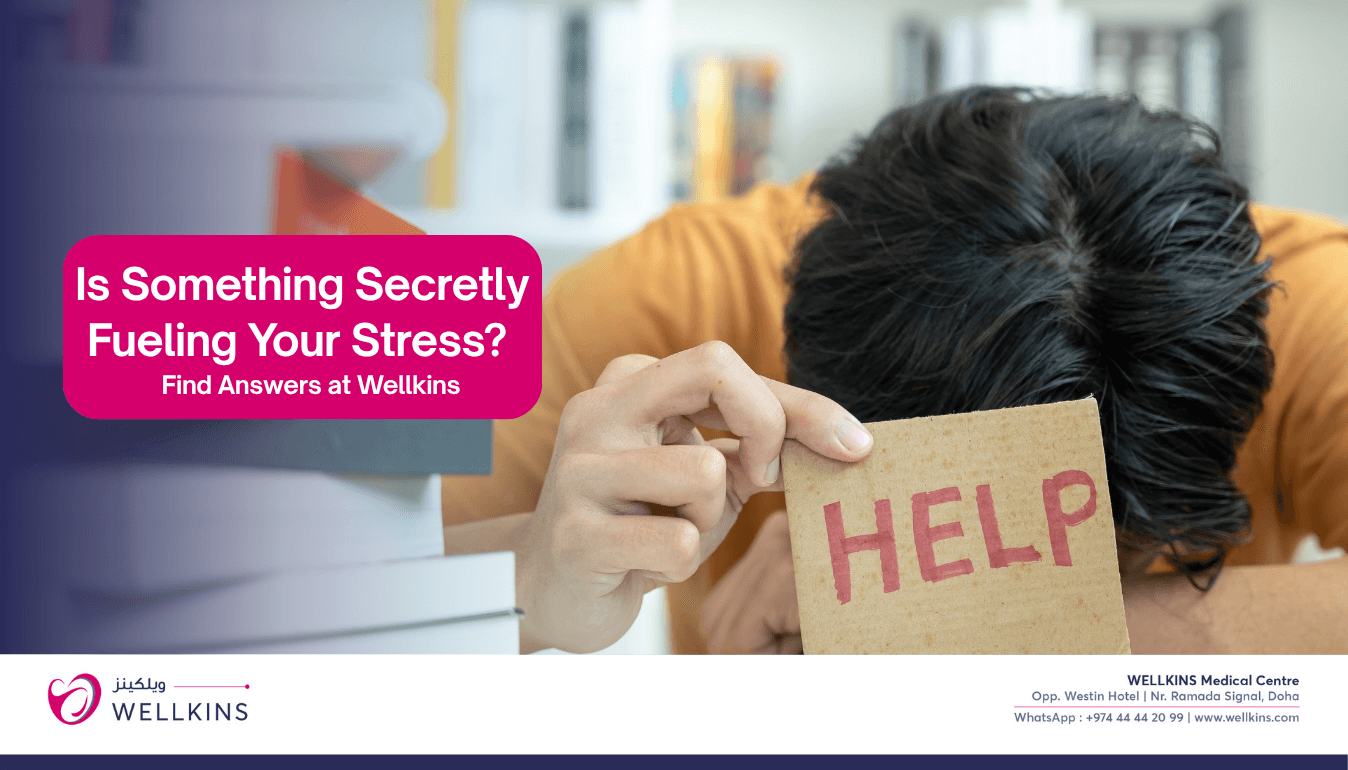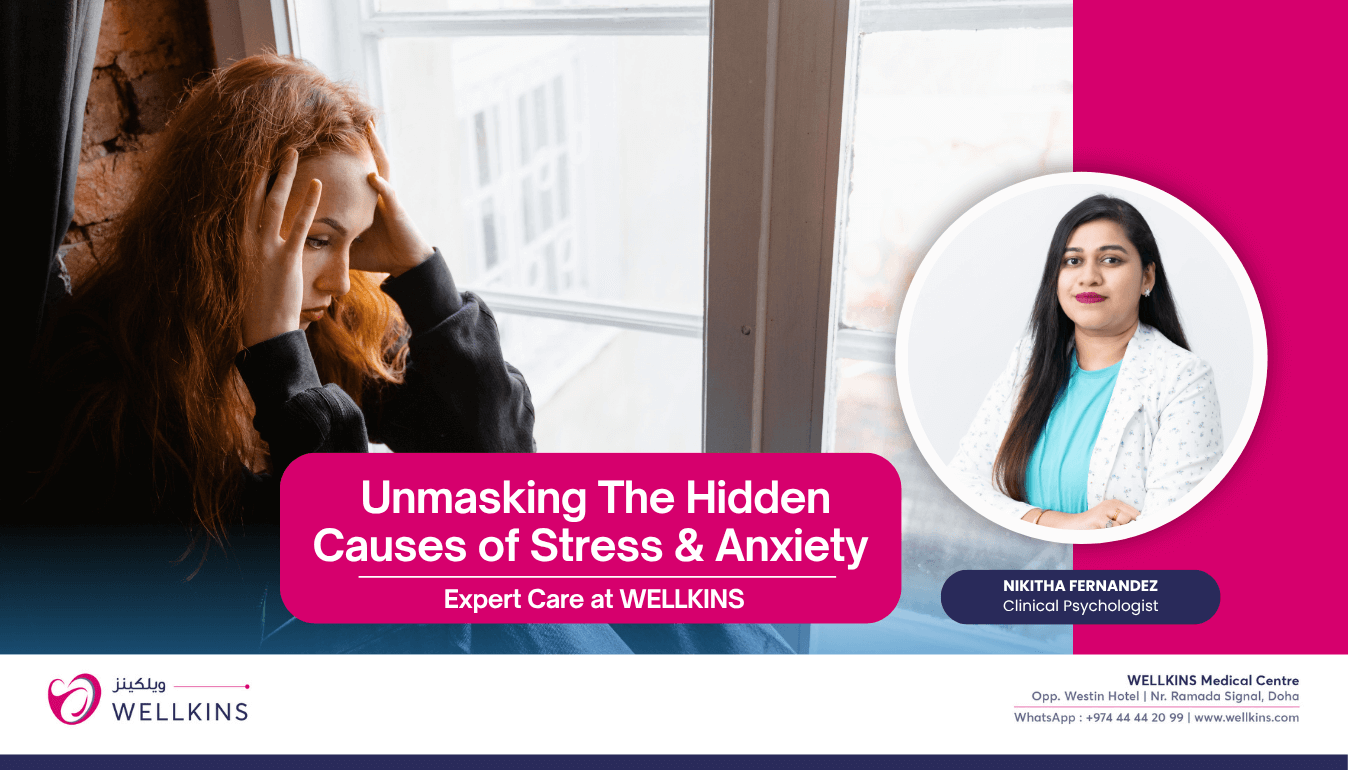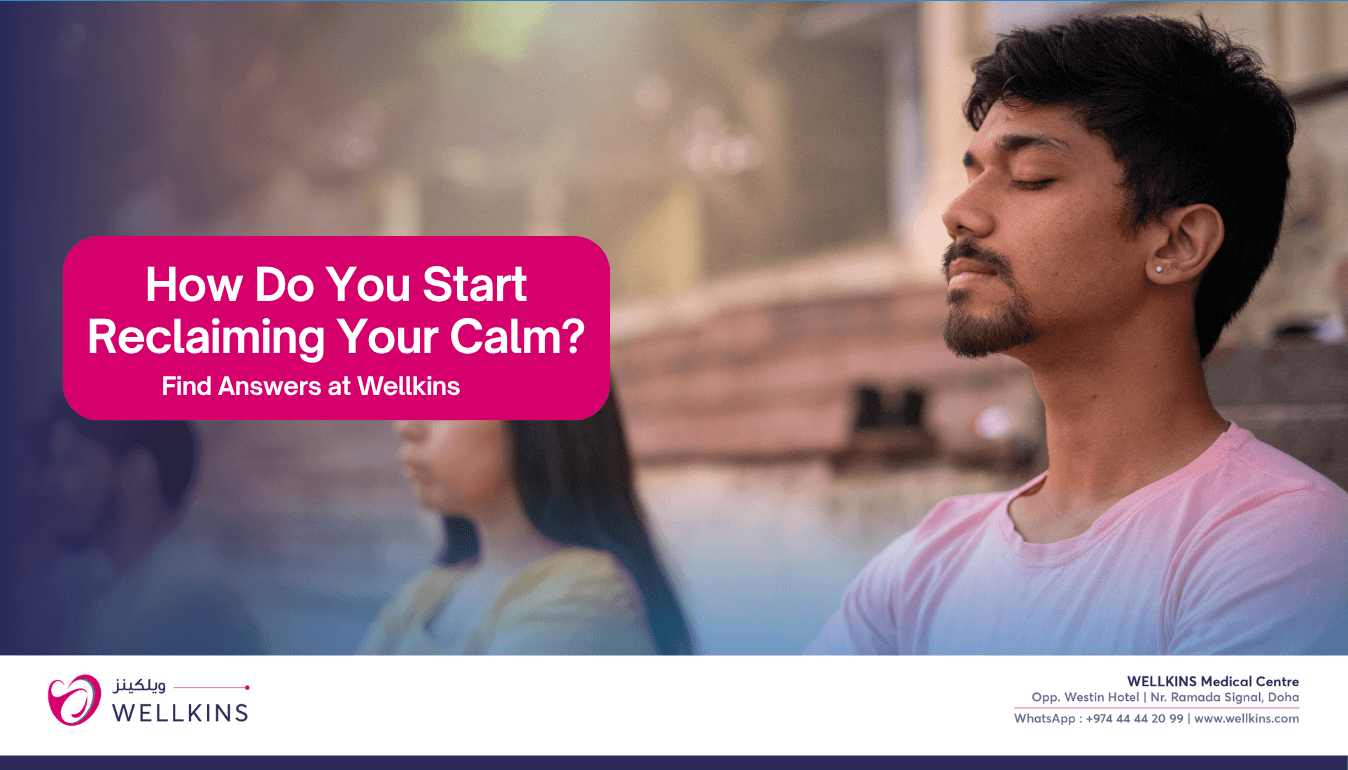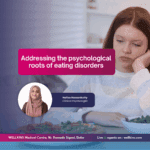Author: NIKITHA FERNANDEZ (Clinical Psychologist – WELLKINS Medical Centre)
Why You’re Always Tired, Disorganized and Don’t Even Know Why!
We usually think of stress as something loud and obvious — deadlines, arguments, and burnout. But for many people I meet in therapy, stress doesn’t look like chaos. Instead, it shows up quietly:
“I’m not even that busy, but I feel constantly drained.”
“My brain feels scattered. I can’t seem to organize anything.”
“I sleep, I eat, I do everything right — but something still feels off.”
Sound familiar?
The truth is, stress doesn’t always shout — sometimes it whispers. And when it goes unnoticed, it can slowly chip away at your energy, clarity, and emotional stability. Let’s take a closer look at what’s really going on underneath, including how your mind and body are affected.
Stress and anxiety often manifest as physical tension or racing thoughts, but for many, these feelings stem from hidden causes that are less obvious than daily pressures. It’s not just about managing visible stressors; it’s about uncovering underlying factors like gut health, nutrient deficiencies, or unresolved past experiences that can silently fuel intense worry, fear, and even physical symptoms.

Root Cause: The Stress You Don’t See
Some stress doesn’t come from the outside world — it comes from inside us, often from emotions and beliefs we’ve buried for years.
Hidden causes might include:
- Holding in emotions like grief, anger, or fear
- Living by silent rules: “I must be perfect,” or “I can’t show weakness”
- Unresolved trauma or difficult early life experiences
- Feeling emotionally unseen or unsupported
These hidden stressors don’t necessarily cause breakdowns — they create a constant background pressure. A tightness in the chest. A tension in the shoulders. A sense of being “on” all the time, even when nothing’s wrong.
What’s Going on in the Body? (Yes, Biology Matters)
Stress isn’t just in your head — it impacts your entire nervous system and brain chemistry. Here’s how:
a) Cortisol — The Stress Hormone
Your body produces cortisol in response to stress. In short bursts, it helps you stay alert. But if you’re under chronic, hidden stress, cortisol stays elevated for too long, leading to:
- Constant fatigue
- Mental fog
- Weak immune function
- Sleep problems
b) Your Nervous System Gets Stuck on “High Alert”
Your body is wired to shift between “fight or flight” (stress mode) and “rest and digest” (calm mode). But if you’ve been living with hidden emotional strain for a long time, your system can get stuck in stress mode.
You might notice:
- Always feeling tense
- Trouble sitting still or relaxing
- Startling easily or feeling overwhelmed by small things
c) Brain Chemistry Disruption
Chronic stress can deplete important brain chemicals like serotonin and dopamine — which help regulate:
- Mood
- Focus
- Motivation
- Sleep
When those get thrown off, you might feel flat, distracted, unmotivated — even when life seems fine from the outside.
Why You’re So Tired (Even When You Sleep)
You might be getting eight hours of sleep — and still feel exhausted. Here’s why:
- Your brain is running in the background, processing all the emotions you haven’t addressed
- Your nervous system is stuck in overdrive, never letting you fully relax
- You might be getting rest, but not recovery — because your body doesn’t feel truly safe
This is the kind of tired sleep doesn’t fix — and it’s one of the biggest clues that hidden stress is at play.
Why You Feel So Disorganized?
Disorganization is more than a messy desk — it’s a sign that your brain is overwhelmed and under-resourced.
When stress takes over, it messes with your:
- Working memory (you forget what you were just doing)
- Planning ability (everything feels like “too much”)
- Decision-making (you start avoiding tasks altogether)
It becomes a cycle: stress makes it hard to stay organized → disorganization makes life more stressful → repeat.
How Do You Start Reclaiming Your Calm?
You don’t need to overhaul your life overnight. Start with simple steps that address both your emotions and your biology.
Emotionally:
- Name what you feel — even if it’s uncomfortable. Journaling helps.
- Notice the beliefs you live by. Are they helping or hurting?
- Spend time with people who make you feel emotionally safe.
- Biologically:
- Practice nervous system regulation — deep breathing, grounding exercises, or gentle movement
- Create better sleep habits — slow down your evenings, limit stimulation, and avoid late-night problem-solving
- Support your brain — eat nourishing foods, hydrate, and give your body rest that feels restorative
If you’ve been tired, scattered, and emotionally distant lately, please hear this:
You’re not failing. You’re not weak. You’re likely carrying more than you’ve ever given yourself permission to admit.
Stress doesn’t need to be loud to be real. If your mind and body are whispering that something’s not right — listen to them. Because once you understand what’s really underneath the fatigue and disorganization, you can finally begin to feel light, focused, and present again.
Read more: https://wellkins.com/psychology-counselling/
Disclaimer: This blog is for informational purposes only and should not replace professional medical advice.








